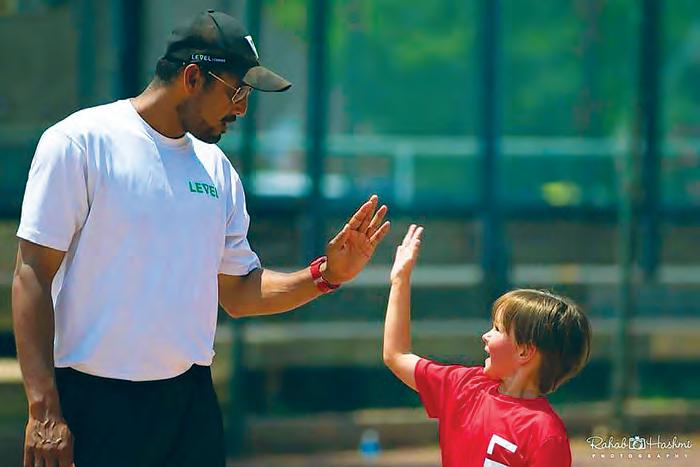
3 minute read
Pay it Forward
Pay it Forward After fulfilling his childhood dream of competing on the international stage, professional tennis player Fazal Syed coaches the next generation
BY HABEEBA HUSAIN
Advertisement
Fazal Syed
Not many people can say they achieved their childhood dream of becoming a sports star. Fazal Syed, however, can. “As a kid, I remember going to the tennis match, and my dream was to play in the Davis Cup — the premier international team event in men’s tennis — for India,” Syed says. “I imagined that I would play for the country in front of the crowd of people cheering you on.”
Years later, Syed accomplished just that when he played for India in the 2001 Davis Cup.
Coming from an athletic family, Syed’s sports journey began at a young age. His father, Syed Nayeemuddin, considered one of the best soccer players India has ever seen, was captain of the Indian National Team that won the bronze medal at the 1970 Asian Games. Nayeemuddin had many friends in sports, and thus his son was exposed early on.
He was also shot down early on, too.
When he first began playing, Syed recalls people telling his father to focus more on his younger brother because he didn’t seem to AT LEVEL 7 TENNIS, SYED TRIES TO INSTILL SEVEN VIRTUES IN HIS PLAYERS: WISDOM, KNOWLEDGE, COURAGE, INDUSTRY, COURTESY, COMPASSION AND CONTRIBUTION. AS SYED EXPLAINS, “[THE NAME OF LEVEL 7] IS BASED ON THE ISLAMIC PRINCIPLE OF THE SEVENTH HEAVEN BEING FOR THE PEOPLE OF THE HIGHEST CHARACTER AND MANNERS.”
possess enough talent. But by age 12, Syed was No. 1 in his state.
People then said he wasn’t good enough for the national level. But by 18, he was No. 1 in India. They then said he wasn’t good enough for the international level. But by 21, he had made it onto the international stage.
“It’s good when people tell me I can’t do something,” Syed says.
Syed took the doubters and converted them into believers through his incredible work ethic — “You have to be twice as good to be considered equal” — which he credits his father for teaching him.
After reaching the top tier in India, Syed’s friend Gautam Anand from the University of California-Berkeley advised him to move to the U.S. if he wanted the sports world to open up for him. It took some convincing, but eventually Syed complied. Anand informed him about an opening for a scholarship at Temple University. Syed then signed up for the SAT, obtained high marks despite his lack of preparation and landed the scholarship at the Philadelphia school.
“My first week, at night there were these sirens going off,” Syed recalls. “I remember asking my roommate if there’s a dignitary coming, and he says, ‘Dude, someone just got shot.’ He looked at me like I had five heads.”
Ranked No. 1 in both singles and doubles, Syed was elected captain of men’s tennis at Temple University. He turned pro during his senior year and, in 2001, fulfilled his childhood dream.
Syed’s professional career took him to about 35 different countries. He specifically remembers visiting a local bakery while in Greece for a tournament. Neither he nor the worker spoke each other’s language, but gestures and smiles did all the communicating. It was enough to grab a bite and even get on a moped for a spontaneous tour of Athens.
“I thought that was very, very profound,” Syed says. “I realized people are people, and there are good people everywhere.”
After his playing career ended, Syed returned to Temple to finish his degree. He then landed a job in Dallas in interest rate derivatives, what he calls “riba on steroids.” He fit whatever he could into his two-door Acura and made his way south.
At that time, Syed wasn’t a practicing Muslim. He admits he originally didn’t see what was wrong with interest. But while living in Dallas, he slowly started to inch closer to the deen. He began observing the Ramadan fast, attending the fajr prayers in










